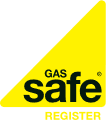Gas Appliance Warning Labels
What do gas appliance warning labels mean?
If your Gas Safe registered engineer identifies an unsafe gas appliance during a gas safety check or service, they’ll follow the Gas Industry Unsafe Situations Procedure (GIUSP). Here’s what the procedure involves:
- They’ll first look to find the cause of the issue and rectify any faults.
- If this isn’t possible, they’ll let you know that the faults must be repaired before the appliance can be used again.
- If they can’t correct the problem straight away, they’ll request your permission to make the installation safe by disconnecting it or turning off the gas supply to the affected part.

Unsafe gas appliance safety warning sticker – Danger. Safety warning. Do not use.
Gas appliance warning labels and unsafe categories
If a gas-related danger is identified in your home, your engineer will attach a ‘Danger Do Not Use’ warning label to the relevant appliance or fitting, and they’ll also provide you with a gas warning notice too. This notice will contain precise details of the unsafe situation.
There are two types of unsafe categories:
Immediately Dangerous (ID)
Just as the category name suggests, an installation that’s been classified as ‘Immediately Dangerous’ is considered an immediate danger to life and property if left operating. Your engineer will disconnect it with your permission, and you won’t be able to use the installation until it’s been repaired and made safe.
If you don’t give your engineer permission to disconnect the installation and it runs on natural gas, they’ll report the situation to the Gas Emergency Service Provider (ESP), which has legal powers to disconnect the gas supply and make the situation safe. However, it’s worth noting that this doesn’t apply to liquid petroleum gas (LPG) installations unless there is a contractual right of entry in place between the supplier and consumer. This can often be part of a contract when a new supplier is put in place.
At Risk (AR)
This classification means one or more recognised faults have been found that could constitute a danger to life or property without further faults developing. With your permission your engineer will turn off the appliance, which shouldn’t be used again until it’s been fixed.
In limited circumstances, turning off the gas supply won’t reduce the risk. If this is the case, your engineer will give you a warning notice and tell you who you need to contact.
Extra information
If you’re told that your installation doesn’t comply with current standards, whether you take action on this is completely up to you. However, it’s always a good idea to bring an installation up to date.
Gas Emergency Service Provider visits
If there has been reports of gas smells or a refusal to allow disconnection of a gas appliances, the Gas Emergency Service Provider may be called to visit your property. If they cannot confirm an appliance’s safety, they might also attach a ‘Danger Do Not Use’ warning label and issue a warning notice.
You’ll be advised not to use the appliance until it’s been checked by a qualified Gas Safe registered engineer, and as the homeowner, it’s down to you to ensure that it’s checked.
If you have any safety concerns or you’re unsure about the actions being taken by your engineer, please contact us.
Gas Industry Unsafe Situations Procedure (GIUSP)?
What is the Gas Industry Unsafe Situations Procedure (GIUSP)? The Gas Industry Unsafe Situations Procedure (GIUSP) is a guidance document available to gas engineers designed to protect you from unsafe gas appliances, chimneys, flues and pipework.
The guidance is relevant to all gas installations fuelled by different types of gas and applies to both homes and businesses.
You can find more information on our dedicated factsheet on GIUSP here.
Useful Downloads
-
GIUSP Explained
Featured Content
Carbon Monoxide Poisoning
Carbon monoxide poisoning is one of the risks of unsafe gas work. Find out how to spot the warning signs.
Useful Contacts
If we are unable to assist with your query due to our remit, our useful list of contacts could help you out.
Find An Engineer
Looking to find a Gas Safe registered engineer? Find one in your local area or check their details.


